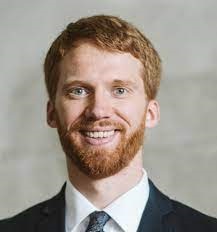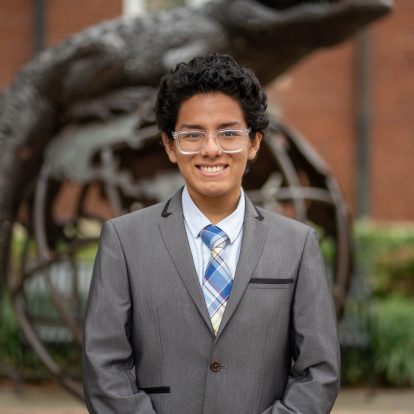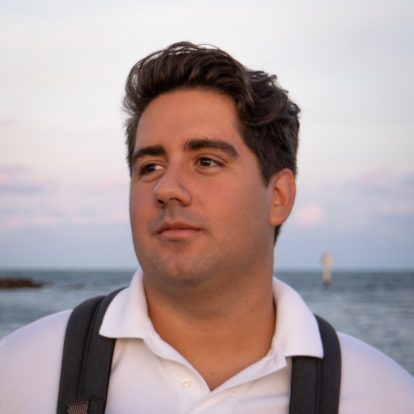Glimpses of Haiti in West Africa, 1900-1920
Philip Janzen
Assistant Professor, Department of History, University of Florida
 In 2016, I was in Ibadan, Nigeria, reading through the Herbert Macaulay collection at the University of Ibadan. Macaulay (1864-1946), was an early Nigerian nationalist. He corresponded widely, and seems to have preserved every scrap of paper that crossed his desk. One unexpected find in the collection was a short biography of Toussaint L’Ouverture, leader of the Haitian Revolution, written by Frederick Douglass. As I read the biography, I wondered how Macaulay might have thought about a figure like L’Ouverture. How might Macaulay have drawn on the history of the Haitian Revolution in pursuit of his own political aims?
In 2016, I was in Ibadan, Nigeria, reading through the Herbert Macaulay collection at the University of Ibadan. Macaulay (1864-1946), was an early Nigerian nationalist. He corresponded widely, and seems to have preserved every scrap of paper that crossed his desk. One unexpected find in the collection was a short biography of Toussaint L’Ouverture, leader of the Haitian Revolution, written by Frederick Douglass. As I read the biography, I wondered how Macaulay might have thought about a figure like L’Ouverture. How might Macaulay have drawn on the history of the Haitian Revolution in pursuit of his own political aims?
Recent scholarship has traced the impacts of the Haitian Revolution in the United States, Cuba, Jamaica, and Brazil (Ferrer 2014; Gaffield 2015; Scott 2018). This research has emphasized how the Revolution sparked similar revolts and inspired anti-colonial politics around the Atlantic world in the nineteenth and twentieth centuries. Nevertheless, there has been almost no scholarly attention to the legacies of the Haitian Revolution in Africa. Given the enormous influence of enslaved Africans on the Revolution itself, this is a curious omission (Fick 1990; Thornton 1993; Geggus 2002, Dubois 2004; Sweet, 2017).
This project examines the legacies of the Haitian Revolution in West Africa. Macaulay’s copy of the L’Ouverture biography is one such “glimpse,” but many other West African intellectuals were keenly aware of Haitian history. They took inspiration from figures like L’Ouverture and Jean-Jacques Dessalines and applied political ideas from Haiti to their own circumstances. Key to such efforts was the burgeoning newspaper culture of West Africa in the early twentieth century. During this period, articles and letters in publications such as The Lagos Standard, The Gold Coast Leader, and The Sierra Leone Weekly News contained frequent references to Haiti. By analyzing these publications, this project will uncover how the Haitian Revolution informed the nationalist and pan-Africanist politics of West African intellectuals.
With the Undergraduate Research Tutorial award, Daniel Antonio Miguel and Patrick Grey, worked with me to find “glimpses of Haiti” in the keyword-searchable African Newspapers Database, part of the World Newspaper Archive available through the UF Library. The student researchers entered search terms such as “Toussaint L’Ouverture,” “Haiti,” “Dessalines,” “Christophe,” and so on; organize and summarize the articles; and begin to analyze the contours and meanings of this Afro-Atlantic dialogue (Matory 2005). This opportunity allowed both Miguel and Grey to hone their research skills and build up their own archives as they moved toward writing their senior History honors theses.
Student Feature: Patrick Grey
What was your involvement in the URTH project? What were your responsibilities?
 I was a research assistant for Professor Janzen and I was tasked with finding relevant primary and secondary sources to support his research on the influence of the Haitian Revolution on African nations during the colonial era. I was also tasked with making a brief abstract of my findings to make it easier to run down through newspaper articles, as well as organize and document each article.
I was a research assistant for Professor Janzen and I was tasked with finding relevant primary and secondary sources to support his research on the influence of the Haitian Revolution on African nations during the colonial era. I was also tasked with making a brief abstract of my findings to make it easier to run down through newspaper articles, as well as organize and document each article.
What were some challenges your experienced in the project? What were some successes or learning moments you experienced?
Some challenges encountered during the project were actually finding relevant sources, for every one useful article, there were probably a dozen articles that were not helpful but I still needed to read everything in order to ensure that an article was relevant or not. The good thing though is that once I found an awesome piece of information it felt like a homerun. I definitely think this research experience made learn how to be patient and to not be discouraged from one bad day, especially in history when the process to investigate something interesting is so extensive, one has to keep firm and continue going.
What are your future plans (in African Studies)?
I would like to continue researching the lives and histories of under-represented communities during colonial times, particularly in Africa there are so many untold and forgotten history that I feel is just waiting to be discovered. This can be relevant to contemporary conversations about disadvantaged communities who do not have their full history or have had their history erased.
I would like to thank Dr. Janzen for giving me the opportunity to work him and his research, as well as showing me the nuts and bolts of what research actually entails. I am eternally grateful.
Student Feature: Daniel Antonio Miguel
What was your involvement in the URTH project? What were your responsibilities?

This summer, I had the opportunity to assist Dr. Janzen in his efforts to discover the legacies of the Haitian Revolution on West Africa. To do this, I used the African Newspapers Archive to search meticulously through newspapers published in Sierra Leone and Liberia for mentions of “Haiti,” “Toussaint L’Ouverture,” “Dessalines,” and other terms that are associated with the Haitian Revolution. Once I had identified relevant articles, I downloaded the articles as PDF files, summarized them and explained their relevance, and organized them by date of publication.
What were some challenges you experienced in the project? What were some successes or learning moments you experienced?
During this research project, I confronted two main challenges: The first was the challenge of sorting through articles that appeared in my search results because they contained words that closely resembled my keywords such as “Hart” or “half ” when searching for “Haiti,” for example. The second challenge was understanding the content of many of the articles that I was reading. Although present-day writing styles and diction are not an unrecognizable departure from that of the late-nineteenth and early-twentieth centuries, I found myself needing to read more closely and thoroughly than I usually need to when reading more contemporary writing. All in all, this research project was incredibly enriching and fulfilling. In conducting this research, I not only gained a deeper knowledge of Liberia and Sierra Leone, I was able to further develop my skills in research and became proficient at using the World Newspaper Archive — a rich and important resource for researchers. I’m deeply grateful to Dr. Janzen for allowing me the opportunity to contribute to a new area of historical scholarship.
What are your future plans (in African Studies)?
As a Cuban-American, my passion for Latin American and Caribbean history has brought me closer to Africa. In my future academic studies, I am interested in learning more about Cuba’s cultural ties to West Africa and acquiring a more comprehensive knowledge of how Cuba’s efforts to become the world’s dominant producer of sugar in the nineteenth century impacted the societies of West Africa.